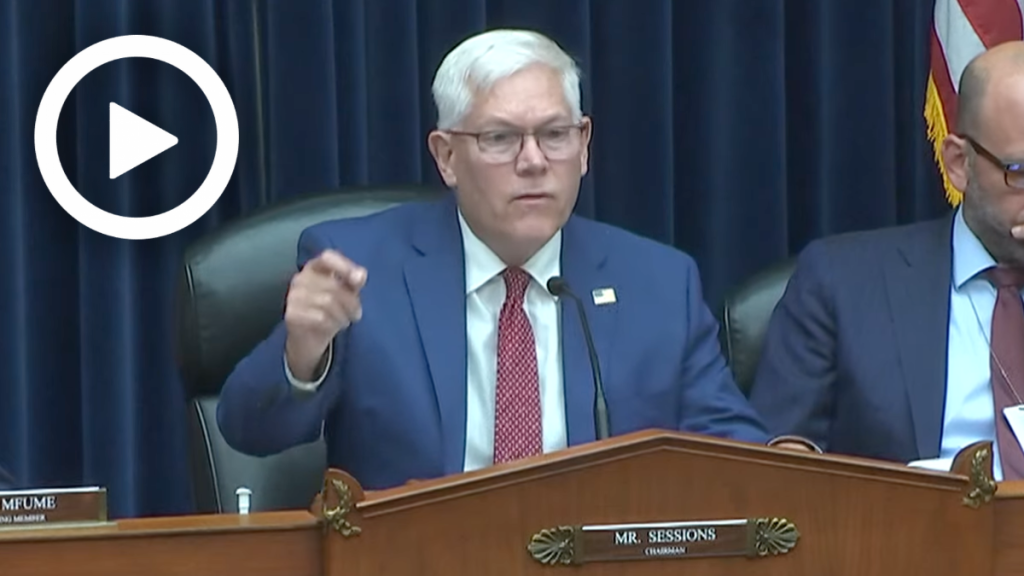
Sessions Opens Hearing on GAO’s 2024 Report Examining Interagency Coordination and Efficiency
WASHINGTON—Subcommittee on Government Operations and the Federal Workforce Chairman Pete Sessions (R-Texas) opened today’s subcommittee hearing to examine the Government Accountability Office’s (GAO) 2024 annual report on fragmentation, overlap, and duplication. Subcommittee Chairman Sessions emphasized the Committee’s interest in bringing transparency to how federal government programs are coordinating together effectively to achieve their common goals without duplicating effort and cost.
Below are Subcommittee Chairman Sessions’ remarks as prepared for delivery.
Welcome to today’s hearing on the Government Accountability Office’s 2024 annual report on fragmentation, overlap and duplication.
Perhaps the core responsibility of this subcommittee is to ensure the business of government is conducted as efficiently as possible.
This includes ensuring agencies provide excellent customer service.
It also includes ensuring agencies have guard rails in place to prevent fraud, waste, and abuse of taxpayer funded resources.
But unfortunately, federal programs have not always been good stewards of public funding.
And to be fair, even when federal agencies strive for excellence, there is always room for improvement, and we must continue our conversation about how we can be better.
Our oversight this Congress has uncovered different ways federal programs have fallen short in efforts to achieve their missions on behalf of the American taxpayer.
And together with the ranking member, Mr. Mfume, we are looking to ask the questions that need to be asked, to hear the perspectives of all involved, and work towards solutions in the interest of the public.
We have explored how to best measure the impact of widespread telework among the federal workforce, to ensure that telework policies are implemented in a way that benefits the American people.
We have called on the Internal Revenue Service, State Department, Social Security Administration and other agencies to improve customer service, reduce backlogs, and overcome longstanding challenges with modernizing information technology systems.
We have examined the federal response to natural disasters, including at a field hearing in Florida where we saw firsthand the recovery efforts following Hurricane Ian.
We have urged the U.S. Postal Service leadership to take necessary action to ensure Americans can have reliable postal service for years to come.
And – again – I’m proud to say our Subcommittee has conducted our work in a fair and bipartisan manner.
That is because these issues are so important for all our constituents who interact with these agencies and depend on them for essential services and our common defense and national security.
And today, we are here again to continue asking important questions that our constituents have in mind:
- Is the federal government operating efficiently?
- Is it taking basic steps to save money for taxpayers?
- Are federal government programs coordinating together effectively to achieve their common goals without duplicating effort and cost?
We must keep asking these questions, because if we didn’t, the answer would instead be inefficiency, waste and billions of dollars lost.
In my observation, both in the private sector and in Congress, it is difficult for any organization to communicate effectively.
And it is difficult to prevent duplication and overlap.
That gets harder as an organization gets bigger…and the federal government is very, very big.
But we cannot accept the right hand not knowing what the left hand is doing – especially if they are doing the same things – as an acceptable way of doing business.
Thankfully, each year for the last 14 years, GAO investigates and issues a report that highlights federal programs with duplicative goals or activities.
In this report they identify opportunities for greater efficiency and effectiveness that can result in cost savings or enhanced revenue collection.
And we aren’t just talking a few dollars here or there.
In the last 14 years, actions to address GAO’s recommendations in the report taken by Congress and federal agencies have resulted in $667 billion in financial benefits.
And there were $71.3 billion in savings just this past year.
To anyone who thinks that oversight doesn’t pay dividends, just look at this report. Talk about a return on investment.
We are pleased to have Gene L. Dodaro as a witness today, who is the Comptroller General of the Government Accountability Office.
I look forward to discussing some of the new programs identified in the report and – perhaps more importantly – some of the opportunities for federal agencies and Congress to address the root cause of the problem: a lack of collaboration and communication.
EIN Presswire does not exercise editorial control over third-party content provided, uploaded, published, or distributed by users of EIN Presswire. We are a distributor, not a publisher, of 3rd party content. Such content may contain the views, opinions, statements, offers, and other material of the respective users, suppliers, participants, or authors.


